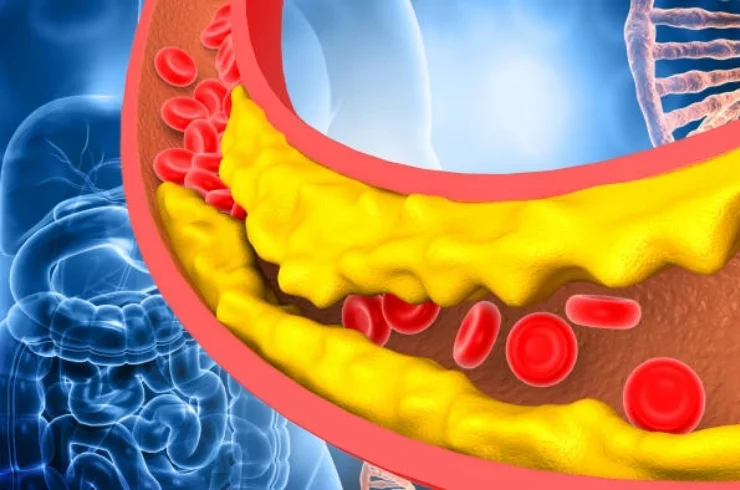Lipid Disorders

Lipid disorders, also known as dyslipidemia, refer to abnormal levels of lipids (fats) in the blood, such as cholesterol and triglycerides. These imbalances can significantly increase the risk of cardiovascular diseases like heart attacks, strokes, and atherosclerosis. At Kurnool Cardiac Center, we are committed to helping you understand and manage lipid disorders for a healthier heart and life.
What Are Lipids?
Lipids are essential fats that serve several critical roles in the body, including:
- Energy Storage: Lipids act as a major energy source.
- Cell Function: They are crucial for building cell membranes.
- Hormone Production: Lipids play a role in producing certain hormones and vitamins like Vitamin D.
However, an imbalance in these fats can lead to health problems.
Types of Lipid Disorders
High LDL Cholesterol (Bad Cholesterol)
- LDL cholesterol contributes to the buildup of plaque in arteries, leading to narrowed or blocked blood flow.
Low HDL Cholesterol (Good Cholesterol)
- HDL cholesterol helps remove excess cholesterol from the blood. Low levels increase the risk of heart disease.
High Triglycerides
- Excess triglycerides in the blood can lead to inflammation of the pancreas and cardiovascular complications.
Mixed Dyslipidemia
- A combination of high LDL, low HDL, and elevated triglycerides.
Familial Hypercholesterolemia
- A genetic condition that causes extremely high cholesterol levels, increasing the risk of early heart disease.
Causes of Lipid Disorders
Lipid disorders can be caused by a range of factors, including:
- Unhealthy Diet: A diet rich in saturated fats, trans fats, and refined sugars.
- Lack of Exercise: A sedentary lifestyle can contribute to high triglycerides and low HDL levels.
- Obesity: Excess body weight is linked to abnormal lipid levels.
- Genetics: A family history of lipid disorders can increase your risk.
- Underlying Conditions: Diabetes, hypothyroidism, and kidney or liver diseases.
- Smoking and Alcohol: Both can negatively affect lipid levels.
Symptoms of Lipid Disorders
Lipid disorders often show no symptoms in the early stages. However, prolonged imbalance can lead to:
- Chest pain (angina) due to reduced blood flow.
- Fatty deposits under the skin (xanthomas).
- Stroke or heart attack as a result of blocked arteries.
Why Are Lipid Disorders Dangerous?
Lipid disorders are a silent risk to your health, as they lead to the formation of fatty deposits in arteries. This condition, called atherosclerosis, can result in:
- Coronary Artery Disease: Leading to heart attacks.
- Stroke: Due to reduced blood supply to the brain.
- Peripheral Artery Disease: Causing pain and reduced mobility in the limbs.
Diagnosis of Lipid Disorders
At Kurnool Cardiac Center, we use advanced diagnostic techniques to assess your lipid profile and overall cardiovascular health. These include:
- Lipid Profile Test: Measures total cholesterol, LDL, HDL, and triglycerides.
- ECG and 2D Echo: Evaluate heart function.
- Treadmill Test (TMT): Monitors your heart’s response to physical activity.
Treatment for Lipid Disorders
Lifestyle Changes
- Heart-Healthy Diet: Emphasize fruits, vegetables, whole grains, and lean proteins while avoiding processed foods and trans fats.
- Regular Exercise: Engage in at least 30 minutes of physical activity most days of the week.
- Weight Management: Maintaining a healthy weight reduces strain on the heart.
- Quit Smoking: Smoking damages arteries and lowers good cholesterol.
Medications
- Statins: Reduce LDL cholesterol and inflammation in blood vessels.
- Fibrates: Help lower triglyceride levels.
- Niacin: Improves HDL levels.
- PCSK9 Inhibitors: Newer medications for severe cases or familial hypercholesterolemia.
Advanced Care
- For patients with severe lipid disorders, specialized treatments like lipoprotein apheresis may be recommended.
Prevention of Lipid Disorders
Preventing lipid disorders is possible through simple yet effective steps:
- Adopt a heart-healthy diet and maintain a balanced lifestyle.
- Manage chronic conditions like diabetes and hypertension.
- Undergo regular lipid profile tests, especially if you have a family history of cholesterol issues.
Why Choose Kurnool Cardiac Center for Lipid Disorders?
At Kurnool Cardiac Center, we offer:
- Expertise in lipid disorder management under the guidance of Dr. Nagendra Prasad Thota, a skilled interventional cardiologist.
- Comprehensive care, from diagnosis to personalized treatment plans.
- State-of-the-art diagnostic tools to detect lipid imbalances accurately.
- Support and education to help you take control of your heart health.
Treatments
- ECG
- 2D Echo
- TMT (Treadmill Test)
- Angiogram
- Angioplasty
- Bypass Surgery
- Heart Failure
- Valvular Heart Diseas
- Arrhythmias
- Cardiomyopathy
- Congenital Heart Defects
- Lipid Disorders
- Coronary Artery Disease
- Coronary Angioplasty and Stenting
- Percutaneous Coronary Intervention
- Coronary Artery Bypass Grafting
- Mitral Valve Repair or Replacement
- Atrial Septal Defect Closure
Consult Kurnool’s Leading Heart Specialist
Reach out to Kurnool Cardiac Center and meet Dr. Nagendra Prasad Thota for advanced diagnostics and treatment.
